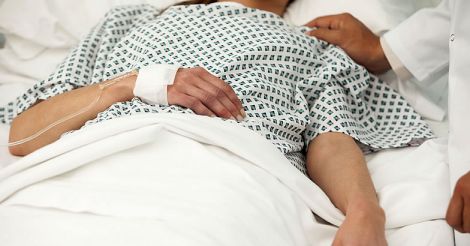“Bitter goes sweet through the mouth.
Lightning burns through cloud
Cover. A water carrier’s call
Becomes thunder on the desert”
-Rumi
There is a saying in Malayalam that you can never wake up one who pretends to be asleep. You can only wake up one who is sleeping!
The grief and sorrow over my father’s death is something that we are struggling to put behind and now those thoughts are slowly giving way to what I, as a person, can do to protect his dignity.
The more I rewind to that day, I feel my father was trying to give a message not only to me but to patients; to patients who cannot speak for reach out to anyone; to patients who have a breathing tube shoved down their throats when they cannot breathe any longer.
Usually these are futile attempts in medical theatrics at the end of life and it is probably done for commercial reasons too. At least half a dozen of my friends and colleagues have shared their experience with me. These are people who lost a parent under the most trying circumstances when their hope against hope was put on futile life-support systems.
Several months ago, I had watched a video clip which show the protagonist (Akshay Kumar) showing doctors in a bad light.
I had criticized the clip for showing doctors in bad light. My most horrendous thoughts were confirmed to be true on January 31, when truth hit me like a ton of bricks being dropped over my head.
Can this really happen in India? The sheer absence of remorse is shocking. It seems that the idealism of budding doctors has been crushed, to make them apathetic to such atrocities.
Now my family is in transition and trying to find the answers as Rumi says in ‘Baqa’ one gets to reconcile and move on trying to get to the lessons taught. We are trying to gain strength while understanding what the whole episode is teaching us.
According to Coleman Barks, ‘Baqa’ is coming back from annihilation with cleansed enthusiasm for particulars. In the state of ‘Baqa’ one re-enters the moment fully performing quiet work sewing the robe of absence.
As days go by, I am convinced that my father's death will not go in vain. The best outcome will be the Patient’s Bill of Rights.
In our country, there is a clear gap in the medical delivery system where it does not exist in its complete form. There exists a gross information asymmetry, which can be bridged with this Bill.
Many a time, we see that the children spend days outside the ICU where their terminally ill parent is admitted, only to receive the dead body after few days.
When should the family member be informed? Why is it that people are afraid of going into Critical care unit?
At any stage when the futility is evident, patients have a right to know as soon as possible. Immediately after lifesaving measures have been instituted, relatives have a right to know about the condition of the patient especially about the futility/chances of improvement. They have a right to participate in the decision related to the treatment given to the loved one, especially if it is an end of life situation.
And if there is no hope of survival, the relative should be allowed to spend the last moments with the patient. And intervention should be restricted to measures which will ease the pain for the patient.
The pros and cons of using invasive life-support devices and the chances for cure have to be clearly explained to patients in understandable language. These devices should be used only if brain functions are present. But what we see is that any patient who has difficulty breathing is put on ventilators and sophisticated devices whether the condition is curable or not.
If it is not for a better outcome for the patient, then why would someone be on these invasive management options?
It should be either for a positive outcome for the patient or for the relative who wants to delay death till a sibling arrives.
Either way, the choice should be that of the patient. There should be no reason why support measures should continue when not medically indicated. Medical reasons for using these instruments are clearly documented.
It is highly unethical to use further measures to prolong oxygenation and circulation after vital systems have stopped working spontaneously. Every human has a right to die in dignity!
Internationally, most countries have implemented the Patients’ Bill of rights. But, in India, there is no such law except with the framework of the Consumer Protection Act.
Therefore, in India, a majority of the people, even the educated, are oblivious of the existence of these rights. They have conceded that the ICU is a forbidden chamber and their only role is to bring medicines as requested by the ICU staff from time to time.
They patiently wait outside hoping for the best, even in cases where the futility of life support may be already evident.
This should not happen in the future. The rights of patients and their relatives have to be passed as an Act and awareness should be created on public fora. These rights have to be displayed prominently in the hospitals and especially in Intensive Care Unit settings.
If this knowledge is widely disseminated among the people, it will improve the trust that the public has in doctors. Hospitals will be a haven where they get compassionate treatment and when the time comes, to die peacefully with respect and dignity.
If trainees and students are trained to use these measures on every patient, while there is no transparency to curb them, over-use of these measures will continue to rise in the future. This should stop.
I hereby suggest the proposal for a Patient’s Bill of Rights to be passed by Parliament. I hope it is passed and becomes an act in the near future. If this Act is properly communicated and the public is educated on how to perform CPR, we may be able to save the common man from the misery they are put through in their worst moments.
Here is my proposed Patient’s Bill of Rights adapted from international sources.
Proposed Patients’ Rights
The following are the patients’ rights and the hospital has to ensure that patients understand these rights.
1. Right to Medical Care: Every patient is entitled to quality care and treatment consistent with available resources and accepted standards regardless of caste creed or religion. Every patient has the right to refuse treatment and to be informed of the consequences of his/her refusal.
2. Right to Respectful Treatment: The right to considerate and respectful care with recognition of his/her personal dignity.
3. Right to Privacy and Confidentiality. The right, within the law and regulations, to privacy and confidentiality concerning medical care.
First degree relatives or nearest family members have a right to information in life-threatening circumstances.
4. Right to information about doctors. The right to know, at all times, the identity, professional status, and professional credentials of health care personnel and the name of the health care provider primarily responsible for his/her care.
5. Right to Explanation of Care. The right to an explanation concerning his/her diagnosis, treatment, procedures, and prognosis of illness in terms the patient can be expected to understand. When it is not medically advisable to give such information to the patient, the information should be provided to appropriate family members.
In the case of emergencies, the information on the futility of treatment measures should be informed to the patient relatives as soon as possible before invasive life support measures need to be taken.
6. Right for Informed Consent. The right to be advised in non-clinical terms of information needed to make knowledgeable decisions on consent or refusal for treatment. Such information should include significant complications, risks, benefits, and alternative treatments available and the chance of cure or benefit.
7. Right to Research Projects. The patient has the right to refuse to participate in any research projects.
8. Right to Safe Environment. The right to care and treatment in a safe environment.
9. Right to information on the Medical Treatment Facility: The right to be informed of the facilities’ rules and regulations that relate to patient or visitor conduct.
Non-smoking rules should be informed to the patient and patient can expect compliance with those rules from other individuals.
10. Right to file Complaints: Patients are entitled to information about the mechanisms for the initiation, review, and resolution of patient complaints.
11. Right of parents of Pediatric patients. Pediatric patients will be provided the same rights and Parents/legal guardians will be afforded the rights mentioned here.
12. Right to information on Patients’ rights: A written policy in the hospital shall be available and it shall identify the roles and responsibilities of each hospital staff in concerning of patients’ and families’ rights.
(Dr. Fouzia Shersad, daughter of former Member of Parliament late E. Ahamed, is currently Associate Professor and Director of Institutional Effectiveness at Dubai Medical College)

























 Representative image
Representative image